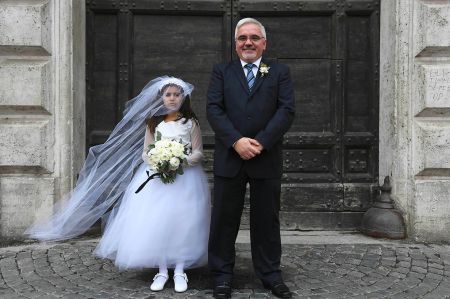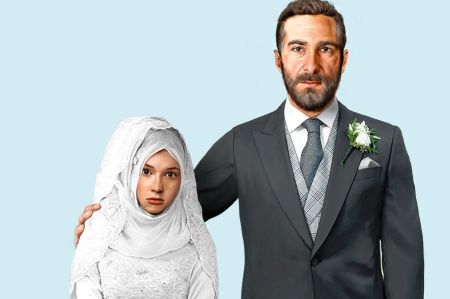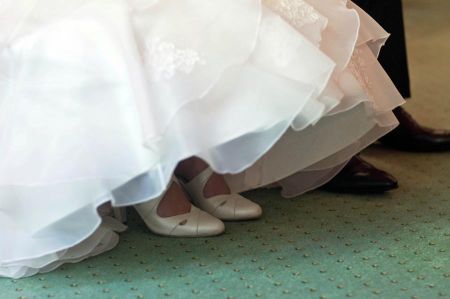Renewed drama in Turkey: Children-Marriage ends fatally
- Written by Portal Editor
Kader means fate and "fate" wasn't just her name. In the meantime, the young mother of an 18-month-old child, who herself only turned 14, has long since been buried. And again Turkey is in turmoil.
Kader suffers a premature birth during her second pregnancy, only a short time later she dies herself. According to media reports, the autopsy revealed that 14 bullets from a shotgun were found in her body. It was suicide after the miscarriage, her in-laws say. Depression of the child bride?
Of course marriage of children is illegal
 Even if her birth certificate reflects incorrect data, which is still common in Turkey, Kader was always a child bride. The authorities only became aware of the young mother in September 2013 and ordered a bone test. This had confirmed Kader a possible age of 16 years. Even then, her marriage age would have been 13 at most. The authorities in the southeastern province of Siirt also had doubts about the suicide and so an autopsy was carried out, which revealed the bullets.
Even if her birth certificate reflects incorrect data, which is still common in Turkey, Kader was always a child bride. The authorities only became aware of the young mother in September 2013 and ordered a bone test. This had confirmed Kader a possible age of 16 years. Even then, her marriage age would have been 13 at most. The authorities in the southeastern province of Siirt also had doubts about the suicide and so an autopsy was carried out, which revealed the bullets.
Now a desperate search is being made for the imam who married the then 11 or at most 13-year-old girl. Of course marriage of children is illegal, no question. Representatives of the important state religious authority have often distanced themselves from the marriage of minors by Islamic clerics. Imams of the Religion Bureau did not engage in such illegal practices, the Religion Bureau officials' union said. How then could a so-called “imam wedding”, a religious ceremony, come about? The girl even gave birth to two children, one of whom died.
"Imam marriages" are not officially valid in Turkey
 Officials are frantically searching for the imam as more details emerge about Kader's life in the media. "Imam marriages" are not officially valid in Turkey, but are often regarded as binding by the families involved. The legal age for marriage in Turkey is 18 for both sexes, but with parental consent it is 17 for girls. With judicial approval, the minimum age can be reduced to 16 in exceptional cases. Human rights organizations have been criticizing this legal gray area for a long time and are calling for the marriage age to be raised to 18 – without exception. And imams are generally not allowed to marry off children.
Officials are frantically searching for the imam as more details emerge about Kader's life in the media. "Imam marriages" are not officially valid in Turkey, but are often regarded as binding by the families involved. The legal age for marriage in Turkey is 18 for both sexes, but with parental consent it is 17 for girls. With judicial approval, the minimum age can be reduced to 16 in exceptional cases. Human rights organizations have been criticizing this legal gray area for a long time and are calling for the marriage age to be raised to 18 – without exception. And imams are generally not allowed to marry off children.
The Office for Religious Affairs (Diyanet) says on the subject that marrying children is not compatible with Islam. The head of Turkey's religious authority, Mehmet Gormez, recently described parents who marry off their daughters to older men as "ruthless," but the Diyanet is regularly criticized for either looking the other way or not being strict enough. In 2003, Prime Minister Recep Tayyip Erdoğan also applied for special court permission for his son to marry a 17-year-old. According to scientific studies, around 180,000 girls under this age are married every year.
The government of the Islamic-conservative AKP has also been criticized for its share of responsibility, in particular for the educational reform that is commonly known as “4+4+4”: the educational path takes the students four years each through elementary, middle and high school but also homeschooling and leaving school after marriage. According to the critics, this opens the door to children's weddings.
Traditional gender roles, poverty, lack of education and religiosity are the main reasons for child marriage, but also the diffuse assumption that girls can do better as a result. For example, Kader was married off through the “Berdel” system – a kind of swap whereby the son and daughter of one family are married to the son and daughter of the other. Officially, Berdel is not tolerated.
Under pressure from the public, Family Minister Ayşenur Islam has now launched her own investigation into the Kader case. The dimension of the problem must also have been known to the government for a long time. The women's organization Kamer, which is active in the south-east, surveyed 60,000 women in 23 provinces: a third were underage when they married. The subject is no longer taboo in Turkey, but the debates at conferences and in the media have so far been of little use.
Gülten Kaya from the Turkish Bar Association even fears an increase in cases. More and more parents are demanding that the courts make their children "older," Hürriyet quoted the lawyer as saying. The state is not always asked at all. Because many child marriages are not officially registered, "the statistics don't tell the truth," warns Erhan Tunç of Gaziantep University, who found that 82 percent of child brides are illiterate. 20,000 families went to court in 2012 to obtain the marriage of their daughters under the age of 16.
If the clergy were punished, the problem would soon be solved, Hürriyet writes. Because the law even provides for prison sentences for all those involved. But usually the state only looks when it's too late - as with Kader.
What are imam marriages
 İmam nikâhı or Imam marriage in German has become a political buzzword for Islamic marriages in contrast to legally binding civil marriages (Turkish: resmî nikah). Ataturk introduced civil marriage in 1926.
İmam nikâhı or Imam marriage in German has become a political buzzword for Islamic marriages in contrast to legally binding civil marriages (Turkish: resmî nikah). Ataturk introduced civil marriage in 1926.
With the Turkish Civil Code (Türk Medenî Kanunu) of 1926, which was based on the Swiss Civil Code, civil marriages were introduced in Turkey and the previously practiced Islamic marriage was demoted to non-marriage. In addition, the Turkish Criminal Code (Article 230/5-6 TCK) prohibits a religious marriage without prior civil marriage (cf. prohibition on religious marriage).
Although the state-regulated, monogamous marriage was part of the "Kemalist core program" (cf. reform protection laws), the civil marriage, which was very bureaucratic for the population and required medical examinations, birth certificates that were sometimes non-existent and other formalities, was initially only accepted and applied very little. Between 1935 and 1950, around 7.5 million officially illegitimate children from illegal Imam marriages were subsequently legitimized with the help of special laws.
However, studies from the 1990s show clear differences between large cities (4% imam marriages) and rural areas (21.6% imam marriages), as well as a regional gap between western Turkey (2.2% imam marriages, 1993) and eastern regions (22.4% imam marriages). In 2009, the European Court of Human Rights ruled that the non-recognition and thus unequal treatment of imam marriages in Turkey does not constitute a violation of Article 8 of the European Convention on Human Rights.
Although the presence of an imam is not actually required under Islamic law when the marriage contract is concluded, in Turkey an imam is traditionally present who gives the opening speech (Turkish: hutbe) and the marriage or closing prayer (Turkish: nikah duası). The presence of (Muslim) witnesses, a marriage guardian of the bride (Wali or Wali mujbir) and the groom, who must agree with the Wali on the marriage contract and dowry, is mandatory. In the Koran it says in the 4th Sura an-Nisā' ("The women") in verse 4: "And give the women their dowry as a gift (so that they can freely dispose of it)!"
Please read as well:
